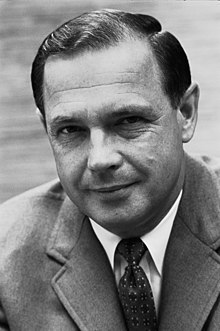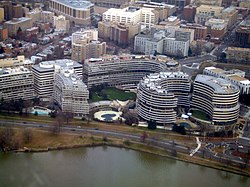Alexander Butterfield
Alexander Butterfield | |
|---|---|
 | |
| United States Federal Aviation Administrator | |
| In office March 14, 1973 – March 31, 1975 | |
| Preceded by | John H. Shaffer |
| Succeeded by | John L. McLucas |
| Personal details | |
| Born | Alexander Porter Butterfield April 6, 1926 Pensacola, Florida |
| Alma mater | University of Maryland, College Park George Washington University |
| Awards | Distinguished Flying Cross |
| Military service | |
| Branch/service | United States Air Force |
| Rank | Colonel |
| Battles/wars | Vietnam War |

Alexander Porter Butterfield (born April 6, 1926) is a retired U.S. military officer, public servant, and businessman. He served as the deputy assistant to President Richard Nixon (1969–73). He revealed the existence of White House tapes during the Watergate scandal investigation but had no involvement in the scandal. In 1973, he became Administrator, Federal Aviation Administration.
Flying career
Butterfield was born in Pensacola, Florida, where his father, Horace B. Butterfield, was a pilot for the United States Navy. He grew up in Coronado, California. Butterfield became fascinated by flying and joined the United States Air Force in 1949. In the Vietnam War, he commanded a squadron of low-level reconnaissance aircraft and was awarded the Distinguished Flying Cross for a mission over South Vietnam in 1964. In 1968, he was project officer for the General Dynamics F-111 and a senior Defense Department representative in Australia with the rank of Colonel.[1][better source needed]
During his military career, he also earned a Bachelor of Science degree from the University of Maryland (1956) and a Master of Science degree from George Washington University.[2]
White House assistant
| Watergate scandal |
|---|
 |
| Events |
| People |
In late 1968, H. R. Haldeman, the Chief of Staff to President-elect Richard Nixon, knew Butterfield from having studied with him at the University of California, Los Angeles. Haldeman invited him to take early retirement from the USAF and become Deputy Assistant to the President. Butterfield retired from the Air Force in January 1969 to assume his new position.[3]
Butterfield was highly regarded for his dedication to the job which led him to work very long hours. He was a deputy to Haldeman, and aside from routine matters such as visitor tours of the White House, Butterfield provided briefing papers for the President. Among his responsibilities was the setting of Nixon's schedule and the maintenance of his historical records, which included the operations of the secret taping system which Nixon had installed in the White House.[4]
Taping system
In February 1973 Nixon appointed Butterfield to be Administrator of the Federal Aviation Administration.[5]
Butterfield was summoned to appear before the United States Senate Select Committee headed by Sam Ervin and was interviewed by staff of the committee on July 13, 1973, prior to going before the senators. John Dean, who testified in June 1973 that Nixon was deeply involved in the Watergate cover-up, had mentioned that he suspected White House conversations were taped, but the committee didn't follow up on that until a document provided by White House counsel J. Fred Buzhardt containing direct quotes intended to impeach Dean's testimony raised suspicions. Butterfield did not want to voluntarily tell the committee of the taping system, but had decided before the hearing that he would if asked a direct question.[6]
As it happened, Butterfield was asked the direct question by the minority (Republican) counsel, Donald Sanders. He told the staff members that "everything was taped ... as long as the President was in attendance. There was not so much as a hint that something should not be taped."[7] All present recognized the significance of this disclosure, and Butterfield was hastily put before the full Committee on July 16 to put the taping system on the record. Chief Minority Counsel Fred Thompson asked "Mr. Butterfield, are you aware of the installation of any listening devices in the Oval Office?" Butterfield replied "I was aware of listening devices, yes sir," correcting the present tense to the past tense.[8]
Post-Watergate
Butterfield was not involved in the Watergate cover-up and, therefore, was not prosecuted. He remained FAA Administrator until President Gerald Ford requested his resignation in March 1975. He then became a lecturer, management consultant, and business executive until his retirement in 1995.[9]
Butterfield was among those who correctly guessed the identity of Watergate informant "Deep Throat" prior to the disclosure in 2005. He told The Hartford Courant in 1995, "I think it was a guy named Mark Felt."
He is a major source for Bob Woodward's latest book, The Last of the President's Men (2015).
References
- ^ Woodward, Bob (2015). The Last of the President's Men. New York London Toronto Sydney New Delhi: Simon & Schuster. p. 5. ISBN 978-1-5011-1644-5.
- ^ Entry on Butterfield from the Nixon Presidential Library
- ^ Woodward 2015, pp. 5–16.
- ^ "Entry on Butterfield from Encarta". Archived from the original on 2009-10-31.
{{cite web}}: Unknown parameter|deadurl=ignored (|url-status=suggested) (help) - ^ Woodward 2015, p. 142.
- ^ Woodward 2015, pp. 147–153.
- ^ Kutler, Stanley I. (2000). Abuse of Power. Simon and Schuster. p. 638. ISBN 0-684-86489-4.
- ^ Woodward 2015, pp. 164–168.
- ^ Woodward 2015, pp. 179–181.
- 1926 births
- Living people
- Administrators of the Federal Aviation Administration
- American military personnel of World War II
- American military personnel of the Vietnam War
- George Washington University alumni
- Nixon administration personnel
- People from Pensacola, Florida
- Recipients of the Distinguished Flying Cross (United States)
- United States Air Force officers
- University of Maryland, College Park alumni
- Florida Republicans
- Nixon administration personnel involved in the Watergate scandal
